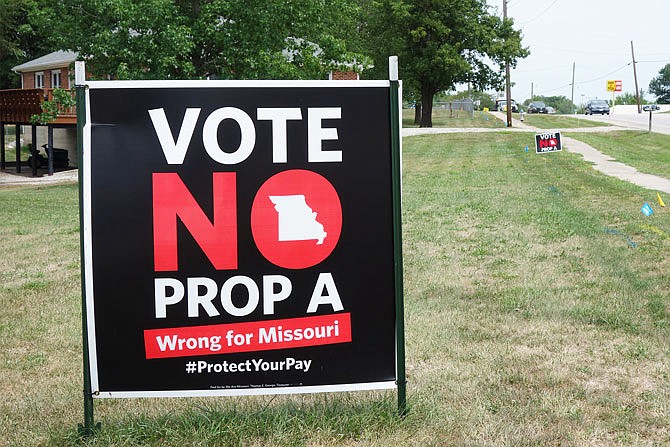Judging by the number of signs around town, it's clear Callaway County residents have strong opinions about Proposition A.
On Aug. 7, Missouri voters will have the chance to reject or approve Missouri's right-to-work law. The proposed law prohibits any contract or employer from requiring someone to be a union member, or to pay dues or fees to a union, in order to hold a job. It also requires unions to represent non-union employees at a unionized workplace.
Though former Gov. Eric Greitens signed it into law in 2017, unions rallied and gathered more than 300,000 signatures demanding it be put to a public vote.
A "yes" vote on Proposition A indicates the voter wants to create the law, while a "no" vote will reject it.
Right-to-work supporters claim it's attractive to businesses and financially beneficial for employees. Opponents said it's a ploy to weaken unions and benefit big business.
Area residents were asked for their take on Proposition A, and the responses received were largely against the right-to-work law.
"Nine out of 10 poorest states are (right-to-work)," said Charlie Baker, of Holts Summit. "Do we want that? Hell, no."
Baker is a foreman at the union Sheet Metal Workers' Local 36. His statistic is accurate - each of the 10 poorest states, aside from New Mexico, has passed a right-to-work law, though that doesn't necessarily mean the law caused the poverty.
Angie Walsh, of Holts Summit, also has union ties - she said her household has been supported by union jobs for 40 years. She said she thinks the phrase "right-to-work" is deceptive.
"Big money is behind this attack on the middle class," she said. "They stand be the ones to profit."
Dava Gardner, of Fulton, said, in her view, right-to-work is an attack on unions.
"My husband works at the nuclear plant," she said. "He's a union member; without a union contract, there is no balance against company wages versus worker wages. There is no guarantee of wage increase, health benefits, sick time, etc."
Gardner said that not only do unions benefit workers, they benefit consumers.
"Skilled trades require apprenticeship programs with specified progression requirements, meaning everyone will be qualified to the same standards," she said. "Would you take your car to be serviced by just any mechanic or are you going to take it to someone who's taken the time to go to school and become certified?"
Some on the pro-right-to-work side, such as state Sen. Caleb Rowden, R-Columbia, say the proposed right-to-work law isn't an attack on unions. In March, Rowden said right-to-work will help unions by forcing them to prove to potential members they offer valuable services.
Gardener said she doesn't buy that.
"(Workers) don't have to pay the dues, but the union has to represent them," she said. "Sound fair?"
Union membership is already on the decline in Missouri. At its peak 1989, 15.5 percent of workers belonged to a union, whereas only 8.7 percent did in 2017.
David Travis, of Holts Summit, said while he's not affected directly by right-to-work, he's seen the negative effects of crippling unions' bargaining power during his 62 years of life. He pointed specifically to the air traffic controller strike of 1981, during which more than 10,000 striking air traffic controllers were fired and banned from rejoining the industry.
"Good paying jobs, with benefits that families in the future can rely on, will bring revenue back to the local economy and reduce crime rates," he said.
Bill Bevard, of Fulton, said he can see both sides of the issue.
"I do realize that strong unions have hurt us in some ways, such as the pull-out of Chrysler and Ford in St. Louis, but I also know that the unions are fair in most of the things they do," he said. "I have worked in Iowa, which is a right-to-work state, and have seen only the best from union people trying to help all the working people. Unions are not bad."
He plans on voting "no" on Proposition A, he added.
A few voices dissented, however. Jeanne Harrington, of Fulton, said she thinks unions are no longer as helpful as they once were.
"Over my life time I have (worked) in unions and out," added Kent Price, of Fulton. "My experience has been they hold back the really good workers and protect the incompetent. (I'm) voting yes on Prop A."

